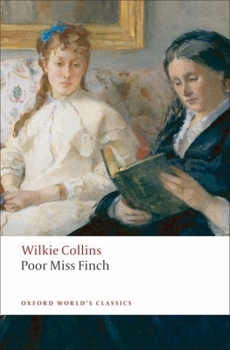Poor Miss Finch
Select Format
Select Condition 
Book Overview
Wilkie Collin's intriguing story about a blind girl, Lucilla Finch, and the identical twins who both fall in love with her, has the exciting complications of his better known novels, but it also overturns conventional expectations. Using a background of myth and fairy-tale to expand the boundaries of nineteenth century realist fiction, Collins not only takes a blind person as his central character but also explores the idea of blindness and its implications. His sensitive presentation of the difficulties, disappointments, and occasional delights which follow the recovery of sight by someone blind since infancy is still one of the best accounts in fiction of a problem which continues to intrigue philosophers, psychologists, and the general public, as it has done since it was first discussed by Locke and Berkeley in the eighteenth century. About the Series: For over 100 years Oxford World's Classics has made available the broadest spectrum of literature from around the globe. Each affordable volume reflects Oxford's commitment to scholarship, providing the most accurate text plus a wealth of other valuable features, including expert introductions by leading authorities, voluminous notes to clarify the text, up-to-date bibliographies for further study, and much more.
Format:Paperback
Language:English
ISBN:0199554064
ISBN13:9780199554065
Release Date:January 2009
Publisher:Oxford University Press
Length:480 Pages
Weight:0.70 lbs.
Dimensions:0.9" x 5.0" x 7.6"
Customer Reviews
1 rating
An Additional Perspective on Poor Miss Finch
Published by Thriftbooks.com User , 18 years ago
The two other reviews of this book are extremely perceptive and well-written. I'd just like to add more on what's truly special about this book, and why I think it deserves a little better notice than it gets. Yes, the plot is improbable, but it's not exactly singular for that alone. A lot of Victorian-era fiction demands we suspend disbelief. It's a fact the Victorian audience wasn't as completely jaded as we are in the 21st century, so judging it by today's standards isn't entirely fair. The book is romantic and at times laughingly improbable, yes, but it's still what I'd consider a ripping good yarn of a book. Aside from this, what made it exceptional at the time was the fact no one had really written from a blind person's perspective before, or at least not with the sort of detail and thought Collins did. The passages written after Lucilla regains her sight (okay, cat out of bag partially but there's MUCH MORE to it) are wonders of insightful prose. Collins describes her challenges with things like depth perception, and in thinking about it doesn't that make perfect sense? Lucilla has to close her eyes, at first, just to make her way across a room. Distance has no meaning for her as she'd never seen it before, or hadn't since before she was one year old. Writing was a challenge, too, though she could write when she was blind. She knew how to form characters but couldn't recognize them when she saw them, much less make them by use of her sight. In another very moving scene Lucilla is shown a round and a square object, and asked "which is round?" She couldn't say. She'd never SEEN the concepts of round and square before. Again, she had to close her eyes and feel them both to know the answer. Throughout all these "tests" Lucilla felt completely humiliated and stupid that she couldn't do these very basic things, and declared she wished she were blind again. Really moving stuff, written with so much empathy and attention to detail. That's an even more exceptional dimension to Poor Miss Finch, in case anyone wasn't swayed by the great storyline. I recommend it very highly to those who love Victorian fiction and would like to explore more of Wilkie Collins's works.







